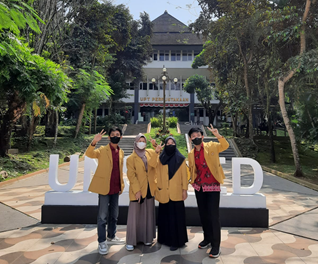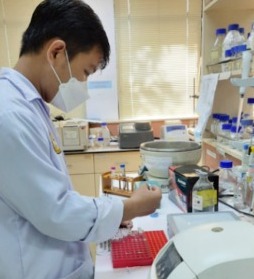UNSOED PKM Team Engineer Formulation of Fertilizer Using Tea Waste
[Unsoed.ac.id, Fri, 26/8/22] UNSOED's Exact Research PKM Team (PKM-RE) successfully engineered microbial-based fertilizer formulations and natural nitrification inhibitors using tea waste to improve fertilization efficiency. The PKM team is chaired by Irwandhi (A1D019018) and consists of Fahmi Khairul Yusuf (A1D021131), Khansa Nabilah (A1D021168), and Ayu Azkiyah (A1D021027) who is supervised by Dr. Purwanto, SP., MSc. This team was formed and started from seeing the problems that exist in the community. Farmers in Indonesia apply excess chemical fertilizers and do not comply with the recommended dosage of fertilizer use. It is detrimental, both financially and to the environment. This can be seen because about 20-70% of Urea fertilizer applied to the land is released into the environment, one of which is through nitrification. Irwandhi said that the nitrification process in the soil can be inhibited using a nitrification inhibitor (NI). The compounds responsible for nitrification inhibition are tannins and polyphenols. Natural materials such as tea waste have the potential to be developed as NI because they contain 55.89% tannins and 25-35% polyphenols.
On the other hand, there is a potential for the use of microbes in the form of plant growth promoting rhizobacteria (PGPR) which have been widely developed as biological fertilizers. The application of PGPR on agricultural land affects gene transcription changes, induces root growth and increases root biomass so that it can stimulate plant growth. However, in conditions in the field, farmers are still reluctant to use biological fertilizers because the time of application of biological fertilizers is not carried out at the same time as the application of chemical fertilizers so that it can increase the need for labor and fertilization costs.
Seeing the existing problems, the PKM-RE team is trying to make innovations by engineering the formulation of microbial-based fertilizers and natural nitrification inhibitors using tea waste to increase fertilization efficiency. This research begins with isolating bacteria, then molecular identification is carried out to test the effectiveness of the formula in the field. This innovation is expected to increase plant growth and reduce labor, as well as the cost of fertilization. In addition, this innovation is expected to control the environmental impact due to the excessive use of chemical fertilizers.


